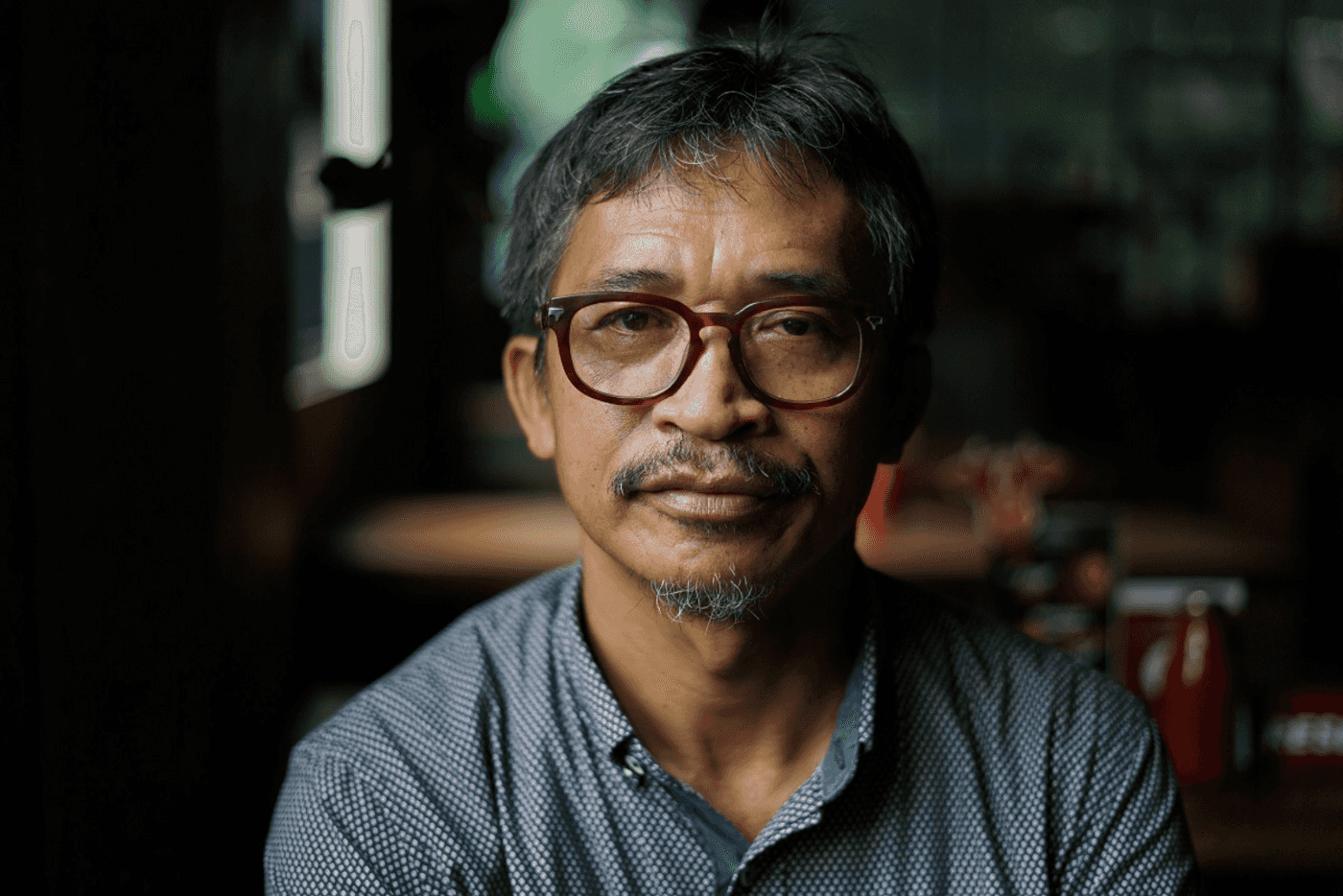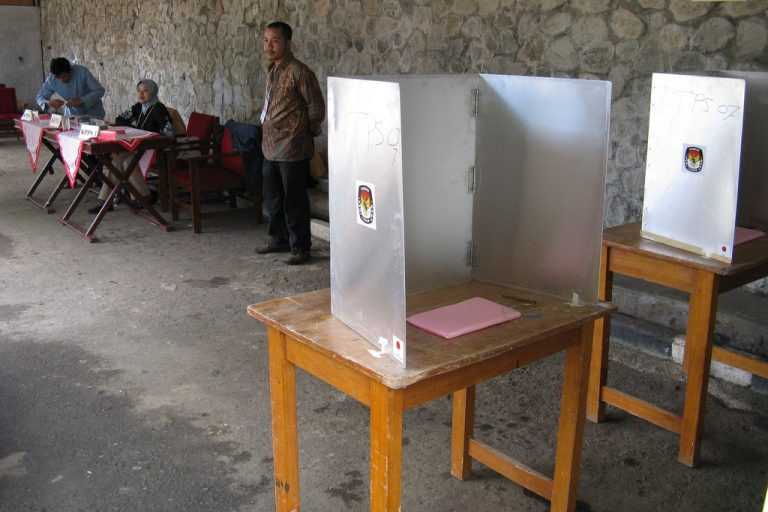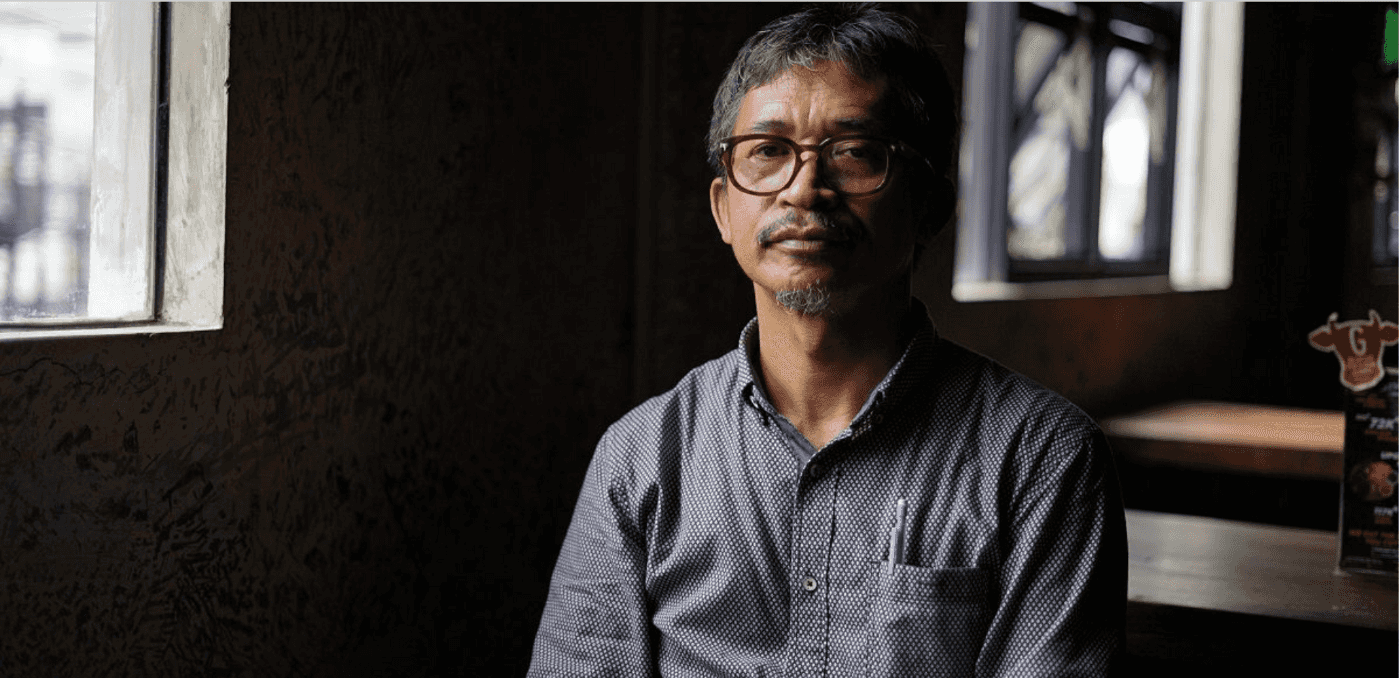- When Abdon Nababan, one of Indonesia’s foremost indigenous rights activists, sought election for governor in his home province, he was provided an unprecedented insight into the corrupt inner workings of the nation’s electoral system.
- In an exclusive interview with Mongabay and The Gecko Project, he explained how the odds are stacked against candidates who seek to turn their back on corruption and “money politics.”
- Previous stories by Mongabay and The Gecko Project, produced under the series Indonesia for Sale, have explored in depth how the nation’s democracy is straining under the weight of corruption linked to plantation industries.
- Millions of voters will return to the polls to select regional heads next week, with this system intact.
In July last year, Abdon Nababan, one of Indonesia’s most prominent activists, announced his intention to run for governor in his home province of North Sumatra. During his decade-long tenure as head of AMAN, the country’s main advocacy group for indigenous rights, Abdon led the organization to a series of high-profile wins. These included a landmark court decision that eroded the state’s legal claim to indigenous peoples’ territories, which have widely been leased out to agribusiness and extractive companies by corrupt politicians. North Sumatra is no exception: Its last two governors were convicted of graft.
North Sumatra, home to nearly 14 million people, is a bastion of the indigenous rights movement, and in many respects Abdon was an ideal candidate — politically connected, charismatic, an experienced campaigner, social-media savvy, and a political outsider and reformer in the mould of current President Joko Widodo. The vote for governor will take place later this month, but Abdon didn’t make it onto the ballot. Instead, the election will be contested by two candidates representing the more familiar faces of Indonesian politics. One is a retired army general, while the other is running alongside a wealthy palm oil baron.
The fact that Abdon couldn’t stand reflects a phenomenon Mongabay and The Gecko Project have been investigating over the past 18 months: the role of money in elections, and its connection to destructive business interests that have established a stranglehold over politics in much of Indonesia, a young democracy still recovering from more than three decades of military rule. To get on the ticket, Abdon says, he faced the choice of illegally paying political parties millions of dollars to back his candidacy, or standing as an independent by collecting the signatures and copies of the ID cards of nearly 800,000 voters. He chose the latter route and, despite garnering more than half a million backers in less than four months, was not able to meet the deadline.
As Abdon tried to get on the ballot, he was afforded an inside look at how business and political interests collide and corruption flourishes in the lead-up to an election in Indonesia. In an exclusive interview with Mongabay and The Gecko Project, below, he described how:
- He was approached by a consortium of business interests who offered to provide 300 billion rupiah ($21 million) to bankroll his campaign;
- The trade-off would have entailed handing over de facto control of budgetary and land allocations in the province;
- Political operatives offered to provide him with an additional 300,000 signatures so that he could qualify to run as an independent, at a cost of 40 billion rupiah ($2.8 million);
- He believes progressive candidates can break through by running as independents, given more time and civil society support;
- He believes progressive candidates can employ national-level policies and transparency initiatives to close the opportunity for corruption.

Mongabay and The Gecko Project: Why did you run for governor of North Sumatra?
Abdon Nababan: Firstly, because they asked me to run — indigenous peoples, farmers, activists. Secondly, because North Sumatra is one of the worst [provinces] for governance right now in Indonesia. We are lowest on the happiness index, almost equal with Papua. There is corruption, and a land mafia. So the second reason is because of the problems. I wanted to do something different in North Sumatra. The third, because it’s my home, my indigenous land. So I have personal reasons to do good things in my own land.
What’s the “land mafia”?
There is a group of a few families in Medan [the provincial capital] that control land transactions. They work with the OKP [Organisasi Kemasyarakatan Pemuda, or youth community organizations], the civilian paramilitaries. Almost all mafia are connected with these organizations. They control the market and they control the bureaucracy related to land. They control the systems of land transfer from communities, even from the state, to become real estate or industrial special zones and so forth. They are criminal organizations.
We’re talking about large-scale land transactions, for real estate — is it also for big plantation projects?
Yes. Yes.
You chose to run as an independent. What was your experience trying to become a candidate?
I chose to run as an independent because I’m not a political party activist, I’ve never been one. So that’s the only way I can run. And really the cheaper way. Because if I run through a political party, it’s huge money involved. Because almost all political parties in Indonesia are not really based on ideology. They are based on political transactions.
You have to pay them just to become a candidate, right?
Yes. You have to pay the party. Even if you are a member of the party, you have to pay. That’s how the system works. [Ed. note: The fact that Indonesian political parties charge extortionate fees for their support, euphemistically referred to as “dowries,” is well-documented. The practice is illegal but persists because, short of running as an independent, candidates for governor, mayor or district chief must have the backing of parties with at least 20 percent of seats in the local legislature.]
Do parties try to control candidates in other ways?
Yes, because the parties also put their operators in control of budget allocations, projects and everything. So if you want to really make a change, the only possibility to do that is by running as an independent.

How do you run as an independent?
To become a candidate, you have to get signatures from your supporters. It’s about 800,000 signatures for North Sumatra. Of course I couldn’t get that. I only got about 560,000 signatures. The challenge for my candidacy was that the time was too short. They asked me to run only four months before registration. We effectively worked for only three-and-a-half months. If we had six months, [we could have gotten there] because more and more voters actually wanted to support me. But we didn’t have enough time to establish the system to manage the [support base] — how to get the signatures, how to copy the ID cards, and how to administer the documents based on the systems required by KPU [Komisi Pemilihan Umum, the General Elections Commission]. So from that experience, I’m convinced that if you want to run as an independent candidate, you have to have at least one year. My popularity and electability consistently increased. Now I’m really sure that [running as an] independent candidate is possible. But we need to work hard and organize well. So it’s possible, but it’s not easy.
How did you go about collecting the signatures and ID cards that you did?
I have been working with indigenous peoples and also social movements in this province for almost 20 years. Not intensively, but I continue to support them. So there are [local] organizations that already have that infrastructure to support the whole process. But it’s not enough. If we ran without the infrastructure of those organizations, maybe we’d need 20 or 30 billion rupiah [$1.4 million to $2.1 million]. But I only spent about 400 million rupiah [$28,000].
How did you raise the money?
I raised the money from the members of [civil society] organizations. Not only from North Sumatra but from all over the country. Also friends from civil society supported me individually. And of course all the volunteers paid for themselves. That’s why I didn’t need a lot of money to pay them. There is no salary, it’s just for free.
Is it normal in Indonesian politics for volunteers to work for free?
No, it’s not normal. Of course, [the other candidates] have volunteers but [the campaigns] pay for everything.
Were there also people or groups who offered to sell signatures to your campaign?
Oh yes. Politics is a business. If you want to run as an independent, you can just buy the KPU. When I was trying to reach the number for my candidacy, [brokers] came to me, offering to help. What I needed to do was to provide money for them to buy [signatures]. So I had the chance to be the candidate if I paid. It’s a business.
How much were they asking?
For about 300,000 ID cards, they asked me for about 40 billion rupiah [$2.8 million]. It was clear, you don’t need to do anything. They will prepare the signatures and everything.
Did you also have businesspeople approaching you and offering to fund your campaign?
Oh yeah. One month after I announced I was running for governor, the survey showed my name was popular. Three people came to me, to offer “cooperation.” To ask me not to run for governor as an independent. They said they could provide me with party support. And they will work for me, and provide me 300 billion rupiah [$21 million]. At that time I said no, I’m running as an independent. I only need about 7 billion rupiah [$495,000]. Seven billion and I will win. But they didn’t like that idea. They wanted me to run through a political party.
Who were these people?
They call them bandar. Political investors. They pay for everything. They buy you. They will provide everything. And then later you can pay them with licenses, projects. Actually they will control everything in your government. That’s common practice because of the high cost of politics. I tried to get information about where they came from, who was behind this offer. I came to the preliminary conclusion that they come from the oil palm sector, mining, and also the property business. They formed a consortium [of people] who have interests in North Sumatra. I think they came to not only me, they tried to do it with other candidates.
So they wanted you to sign on with a political party.
Yes. Because actually they will also deal with the party. They don’t have a party, but they will go to the party, and say, “We paid for him, he is a good candidate, it’s easier to put him in power.” They will operate between the party and the candidate. So the party benefits, and the candidate of course benefits because he secures the candidacy. But all transactions between the two will go through this mafia. If you continue [to] investigate it, you will find out who is in charge of it.
The progressive movement in Indonesia — environment, indigenous rights, anti-corruption — has made some big accomplishments. But there’s obviously a lot more that needs to be done on these fronts. Do you think the path forward is to try to capture political office, or do you think there’s more that can be done outside the government?
From outside the government you can only apply pressure. But within politics, the source of the problems for Reformasi [Indonesia’s post-authoritarian era] right now comes from the political parties. Because the political parties don’t really work for politics. There’s no ideology.
Do you think the progressive movement in Indonesia is reaching the limits of what it can achieve without capturing political office? Or can it keep moving forward from outside?
The aim is to make the issues of the social movement become political. And now in North Sumatra, even in the political debate on television, they talk about indigenous rights. [The moderators] ask candidates for their commitments to what I campaigned on. If they fail to do that, there is a chance five years from now [during the next election] to challenge them with the same issue.
Do you think that if a progressive candidate gets into office, they have the power to take on this system — the oligarchs, the companies, the corruption around natural resources and licensing?
Yes. Actually they have the power maybe not to revoke the license, but they have the power to make the systems open. To expose who controls what and how they control it. So we don’t even need to go directly against the mafia. Just establish the systems so that there is no place for them to play. And the KPK [Indonesia’s anti-corruption agency] can take care of the rest. We don’t even need to do it in a controversial way. Because this is all about data.
Do you think that for more progressive candidates to take office, there needs to be a reform of the system? Or do you think more scrutiny of how the system is working now by NGOs and journalists will help more good candidates get into office?
There are new systems already there at the national level that can be used. Like the One Map policy. Or you can use the agrarian reform [pursued by the] office of [President] Jokowi. But all of these national policies are not yet working at the ground level. You need to [employ] all these good things in one certain territory like North Sumatra. Like the license review. [Ed. note: Indonesia’s central government recently undertook a massive review of mining permits across the country, cancelling thousands of them. A similar initiative is underway in the palm oil sector.] There is a presidential decree about that. Just implement that in your province, review the licenses and then open up all the licenses by putting them on a website. And invite reports from people, about what’s going on with these whole licenses. You have the legal basis to do that.
Where do you think the next generation of progressive leaders will come from? Will they come from people in the NGO sector who already recognize what’s going on with the environment? Or will it come from outside that movement?
Because of the high cost of politics, it’s difficult to get good leaders from NGOs. The realistic way is to get new leaders who are progressive businessmen, like Jokowi. Because they know how business and politics work. An NGO activist like me, we know how government works. But we don’t know how money works within the political system.
How significant do you think corporate influence over politics is as an obstacle to change? Would more indigenous territories be recognized by the state, for example, if there weren’t so many politicians with close connections to companies trying to exploit those same areas?
Even candidates who are indigenous themselves, they are trapped in that system. They do try to change things, but it’s very small. If we have money as a movement to support candidates, they will make real change. Like in Mentawai [Islands district], for example. But we also know that they also get support from business.
Is there a way to get support from business in a way that’s not corrupt? The people who approached you that you turned away, for example, wanted to give you money in exchange for business licenses. Is there a way that business can support a candidate in a way that’s not harmful?
That’s what I want to try. I want to raise money from corporations that are in line with my vision. Tourism, creative economy. I want to experiment because most of the money going into politics right now comes from dirty business — oil palm, mining, land. There is no money from … AirAsia or Agoda, you know? I’m not anti-corporation. But I’m against dirty business. Through politics, we can change the player, from destructive development to sustainable development. But now, destructive development controls politics. We have to identify who will support sustainable development. That’s the idea.
Research suggests it’s harder for a progressive candidate in Indonesia to break through in rural areas, where the level of education is lower and the economy might be concentrated in a single sector, as opposed to urban areas. Do you think there’s anything that can be done to help a progressive candidate break through in such areas?
In that situation, what I experienced, it’s easier for AMAN. But AMAN has to invest in strengthening [local] organizations. Because we just have to pass the obstacle to becoming candidates. If you become a candidate, and you come from the movement, you will [win]. So that’s why I say for a long time to friends, just focus on the candidacy.
It sounds like you’re hoping your example now, going as far as you did, can lead to more people running for office.
Yes. That’s the lesson I’ve learned.
So what’s next?
They asked me to run in Banten [province]. We’re still thinking about that, or what the strategy could be if I’m elected to become an MP [member of parliament]. The challenge is how we can optimize our efforts within parliament. So now we have one or two or three options. But I don’t really know what will be most strategic for me.
This interview has been edited for clarity and length.
This article was produced by The Gecko Project and Mongabay as part of Indonesia for Sale, a series about the corruption behind Indonesia’s deforestation and land-rights crisis.

